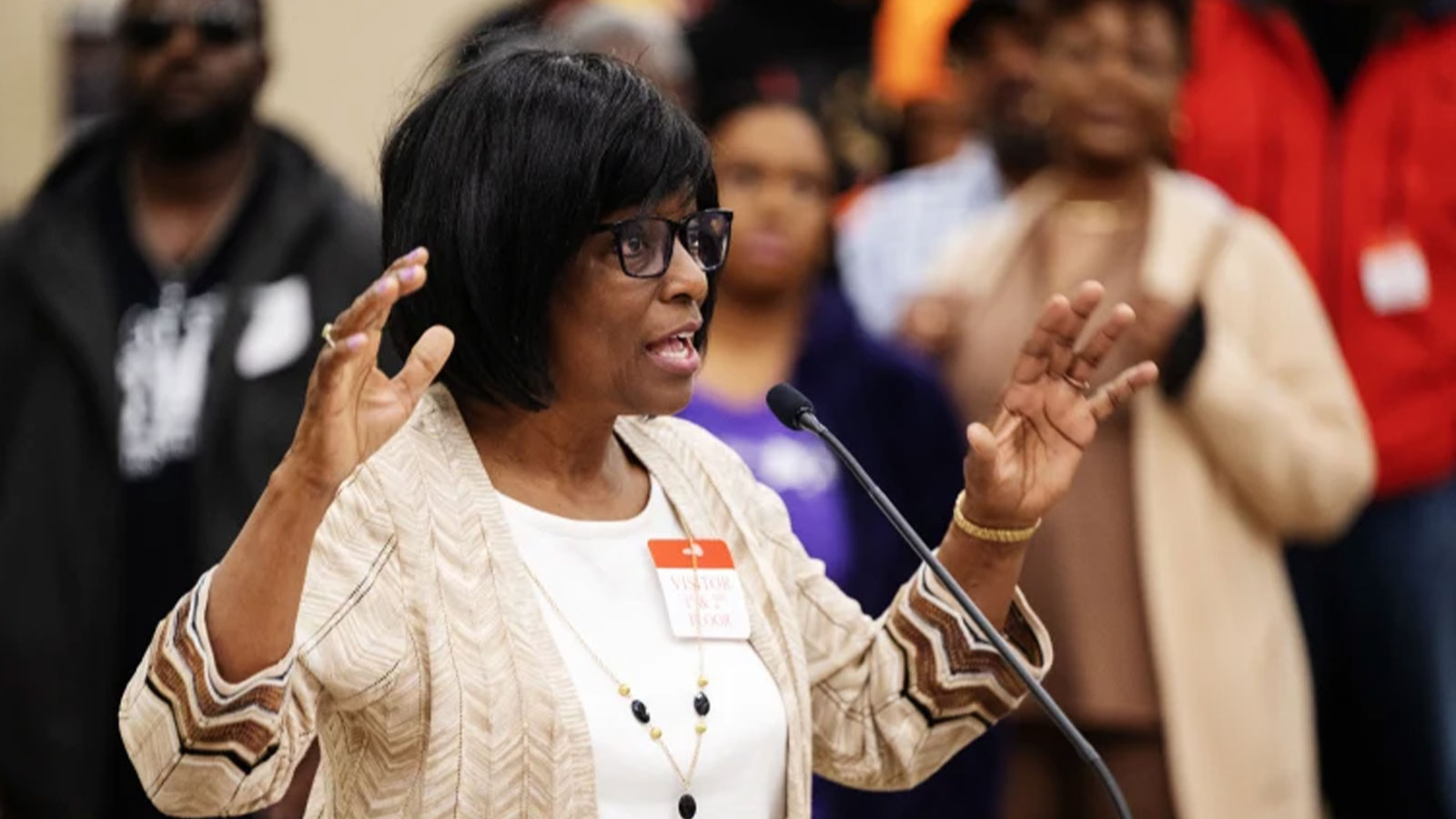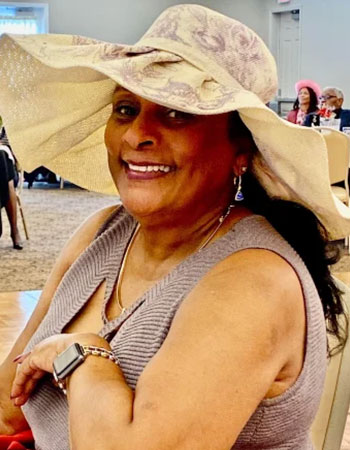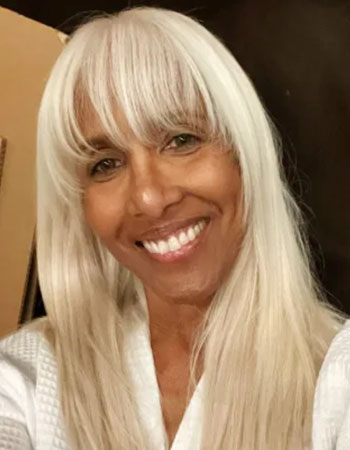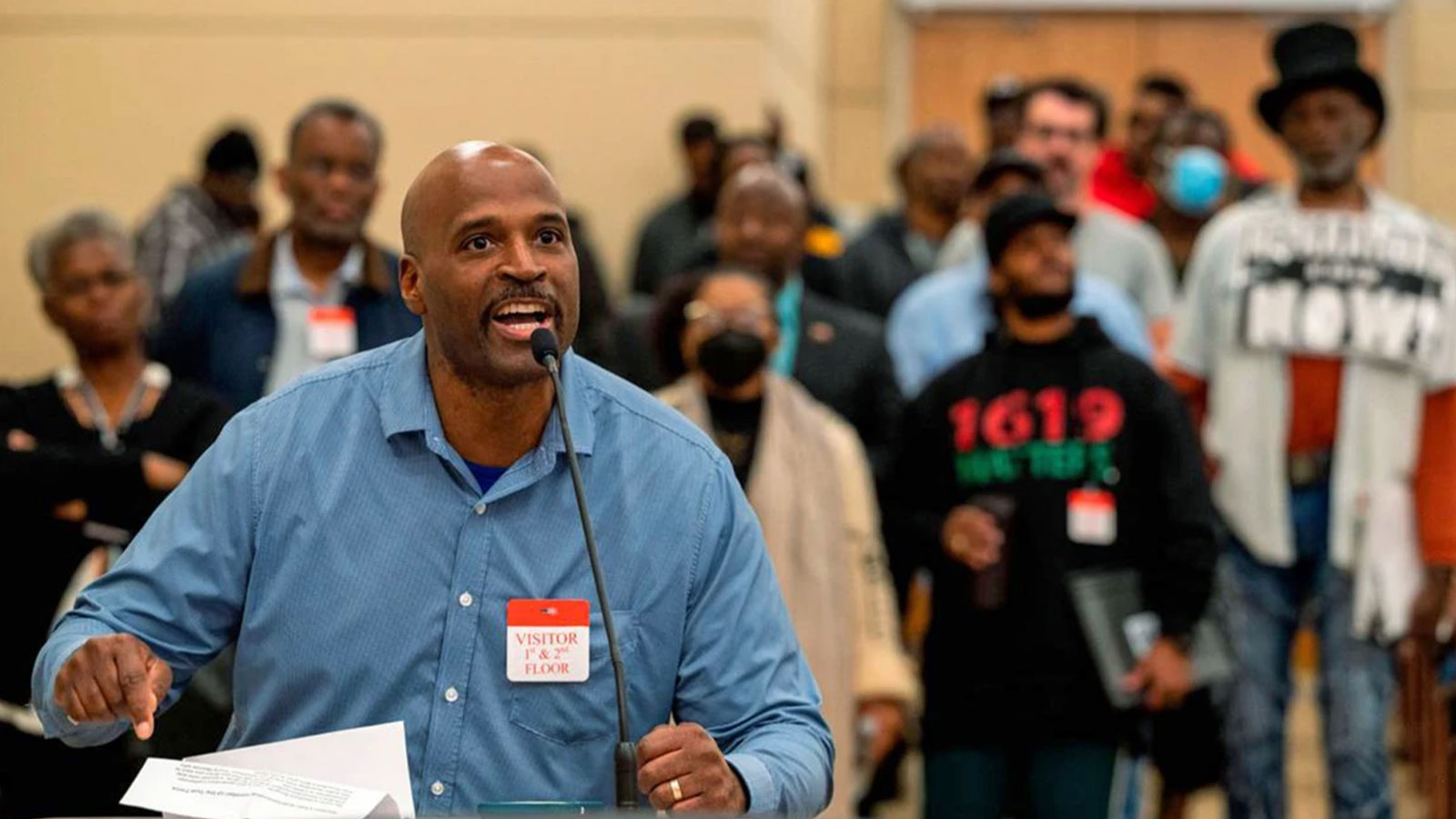Black Californians who spoke to NBC News say they think reparations are necessary, but they very much doubt the most effective policies will come to pass.
As the California Reparations Task Force crafts its recommendations to the state Assembly for a vote by July 1, Fahizah Alim is among the countless Black Californians who have seen generations of change in the country’s most populous state — but are still deeply skeptical that compensation for the centuries of racial oppression will materialize in any substantive form.
“Unfortunately, many irrationally see it as a zero-sum game: ‘If we win, then they lose.’ So, I’m not optimistic,” she said. “Hopeful, but not optimistic. Even in liberal California, the status quo runs deep, and that’s white folks on top and Black folks on the bottom.”

Gloria Pierrot-Dyer of Roseville, Calif., speaks during the public comment part of the Reparations Task Force meeting in Sacramento on March 3 (Paul Kitagaki Jr, Zuma Press)
The nine-member task force, impaneled by Gov. Gavin Newsom, has been at work for almost two years, researching the depth of the harms of racism on Black people while also deploying a cadre of economists to calculate, in dollars, the impact of the damages. Members have made it clear that no amount of financial restitution can measure up to the devastation of slavery and the subsequent forces of it.
But most Black Californians interviewed by NBC News made two things clear: One, they want money as a major part of reparations, and two, they very much doubt they will get their wish. “As Dr. Martin Luther King, Jr., said in a famous speech, we’re coming for our check,” said Maureen Simmons, who as an intern for state Assembly member Shirley Weber, completed research that led to AB 3121, the bill to create the Reparations Task Force. Despite their desire for financial restitution, most Black Californians remain incredulous.
“I’m laughing because it’s pretty foolish for any Black person in America to wholeheartedly believe that reparations will come to us in the form of a financial payment that will be fair compared to what slavery did to our people and, really, did to us,” said Ron Finney, an entrepreneur in San Diego said. “We can hope for something, but it’s hope. Not to be pessimistic, but we can’t be optimistic about anything. And why’s that? Because of the history of how Black people have been treated, from slavery to now. So, I’d be surprised if we received anything.”
The task force’s recommendations will be evaluated by state lawmakers to introduce bills, which would still have to be passed by the Legislature and signed into law by Newsom. Members have said they are weighing whether to recommend payouts to individuals. “But we’re going to make recommendations on many areas that I think will have a longer lasting impact on African American life,” said committee member Reginald Sawyer-Jones, an assembly member.
Receiving money as part of reparations, though, is critical to creating generational wealth, many said.
“Far too many Blacks in California have not been able to overcome the insidious obstacles that exist for our economic rise and are unable to get bank loans to improve their property while their children attend schools with the most limited resources and are subject to the tyranny of poverty,” Alim said. “Reparations would make a great difference for all of us in accumulating and passing on generational wealth. That’s what we have not been able to do and that’s what reparations would enable us to do because of 400 years. We have been shut out of the financial lifeblood of America.”

Fahizah Alim (Courtesy Fahizah Alim)
As one of about 200 Black students at the University of California, Berkeley, in the 1960s, Alim demonstrated on campus with Black classmates demanding a Black studies department, the hiring of Black faculty and the admission of more Black students. Ultimately, the students’ grievances were addressed. Those victories, while rewarding for Alim, were also her indoctrination to the harms of white supremacy and “the structural and systemic racism that kept Black people and Black communities impoverished,” she said.
Alim is also a recent retiree from the California Civil Rights Department who marched with the Black Panthers and the Nation of Islam as those organizations called for reparations. “One thing that I have learned through 50 years of studying American history is that white people don’t want Black communities to thrive,” she said.
In Los Angeles, the largest city in California, Black people make up only 8% of the population, while 35% of its homeless population is Black. This fact gives Michelle J. Smith pause about the potential programs being laid out as part of reparations because they may not reach the right population.
“The average Black person is thinking 40 acres and a mule,” said Smith, a beauty industry entrepreneur based in L.A. “But there are so many other things that are wrapped up into this, things that are supposed to be for the betterment of our daily existence. They talk about putting things back into the Black community or making sure we have these programs and centers. But, hey, the Black community here, because of gentrification, is almost nonexistent. It’s nothing like it was.
“So, you raise an eyebrow about who these programs are really going to help.”

Michelle J. Smith (Courtesy Michelle J. Smith)
At the public hearings last weekend in Sacramento, Black residents called in and many traveled for hours to share their recommendations for reparations and concerns about the results the task force will produce. For hours on consecutive days, they lined up to share their thoughts. A few shared they are hesitant to believe financial reparations will happen and some proposed to let “bygones be bygones.” Others suggested that other groups, like indigenous people, be considered first.
Skepticism about reparations becoming a reality particularly around whether there will be payouts to individuals versus programs that would target policy areas like housing or education.
Marcus Gray, a pharmaceutical sales representative, traveled up to Sacramento from Gardena in Los Angeles County to emphasize how crucial cash-based reparations are to Black America’s ability to thrive.
“We keep hearing about programs,” he said. “Don’t get me wrong: I’m for programs. But I’m for money first. And I can’t make myself believe it will happen the way we want it to happen because the system doesn’t want us to have life-changing money.”
At the Black Expo in Sacramento a few weeks ago, a discussion on reparations created a packed room, Sacramento NAACP President Beverly Williams said. “It’s an ongoing discussion, an important discussion,” she said. “But let’s be clear: There is no reparations without compensation.”
Williams understands the prevailing skepticism, but said hope is dominant for her because the task force has covered so much ground. She also cited Barack Obama and Kamala Harris as reasons for optimism as well.
“Ronald Reagan made sure the Japanese received reparations and the Native Americans have received some reparations,” she said. “With all the work done to this point for reparations for Blacks in California, I have to be optimistic — although I understand the source of people’s skepticism.
“But I have lived in a day where I’ve actually witnessed a Black president and now a Black female vice president,” she added, “so that lends a little bit more hope for me because I’m seeing some things I never thought I’d see. Reparations would be another thing I never expected to see.”
Source: NBC News
Featured image: Matthew Burgess of Sacramento speaks at a public hearing Saturday of California’s Reparations Task Force (Lezlie Sterling, Zuma Press)















